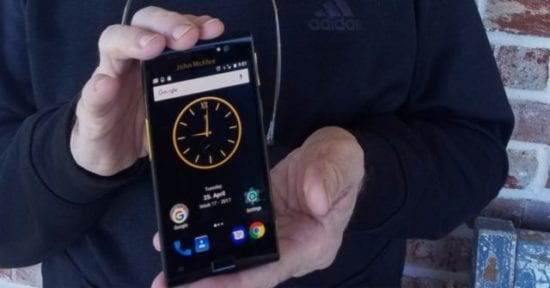McAfee, creator of the eponymous antivirus program, plans to release the John McAfee Privacy Phone later this year through MGT, a cybersecurity firm that he heads. He shared details about the Privacy Phone exclusively with Newsweek. IT security experts from cyber security companies DomainTools, Tripwire, ESET, AlienVault, Cylance, Comparitech.com, Synopsys and AlertLogic discuss smartphone security and whether there is a need for such a device.
Kyle Wilhoit, Senior Security Researcher at DomainTools:
 “I’m a proponent of any privacy focused product, and that includes smartphones. To be sufficiently secure, there would need to be a combination of physical and virtual security mechanisms embedded into the device. I would be curious to see the full feature set of such a phone.
“I’m a proponent of any privacy focused product, and that includes smartphones. To be sufficiently secure, there would need to be a combination of physical and virtual security mechanisms embedded into the device. I would be curious to see the full feature set of such a phone.
Everyone carries a majority of their day to day lives on their smartphones. Myself included. That’s why modern day smartphones are continually targeted and attacked on a daily basis. Most often, malware is the tool of choice for miscreants that decide to attack smartphones. The way in which smartphones are targeted varies based on their operating systems. The success of these attacks vary based on marketplace availability and distribution, security of the device itself, application control and other application specific security controls.
There are some mobile operating systems that are targeted more frequently by malware authors, like Android. This is likely due to the success rate of victims installing side-loaded android applications. (Applications that are installed from a untrusted source, and bypass the need for Google’s Play store.) An additional contributing factor to the success of Android malware is the Google application ecosystem. Almost anyone, malicious or not, can contribute an application and have it distributed via Google’s Play store as well as outside sources like websites and forums. This combination of application ecosystem and relatively open distribution cultivates an environment that is rife with malware.
I’m a proponent of any privacy focused product, and that includes smartphones. To be sufficiently secure, there would need to be a combination of physical and virtual security mechanisms embedded into the device. I would be curious to see the full feature set of such a phone.”
Tim Erlin, VP at Tripwire:
 “Smartphones are a huge target for attackers. The more of our business, both personal and professional, that we conduct through that high powered computer in our pocket or purse, the more attractive a target it makes for cybercriminals.
“Smartphones are a huge target for attackers. The more of our business, both personal and professional, that we conduct through that high powered computer in our pocket or purse, the more attractive a target it makes for cybercriminals.
Today, the device you carry around with you is an incredibly powerful computer. Our phones can store and access massive amounts of data through multiple connection methods. They are powerful devices, but that’s also what makes them attractive targets for criminals.
In the connected world in which we now live, it can be extremely difficult for the average consumer to have control over their own information and how it’s used or transmitted.
We’re well past the point of telling people not to use their smartphones for sensitive data or transactions. If there’s an app for it, people will use it.”
Mark James, IT Security Specialist at ESET:
 “Smartphones today are sadly susceptible to hacking. So many features and functions are automatic as we expect, we want automation, we like the fact that something just happens but the security implications of this are huge. If we are not sure or don’t understand the consequences of auto-joining free Wi-Fi, or allowing any application to track your location even when not using it, then how can we be sure of our own security? These functions are switched through software, and software can be hacked, there is no better failsafe than a physical switch.
“Smartphones today are sadly susceptible to hacking. So many features and functions are automatic as we expect, we want automation, we like the fact that something just happens but the security implications of this are huge. If we are not sure or don’t understand the consequences of auto-joining free Wi-Fi, or allowing any application to track your location even when not using it, then how can we be sure of our own security? These functions are switched through software, and software can be hacked, there is no better failsafe than a physical switch.
Smartphones are used for different tasks, some use it extensively to order, store and manage their daily lives almost down to the minute. Some use them to keep an eye on what’s going on around them and store very little. So it stands to reason some people will require a much higher degree of security or indeed privacy. The concept of going back to “dip switches” for hardware functions in a world where we are forced into automation may just be the next “thing” and it will be right for some. It’s the choice that’s important, in a world where we are getting increasingly more aware of our privacy and what it means to leave it solely in the hands of others, it’s good to have options.”
Javvad Malik, Security Advocate at AlienVault:
 “Modern smartphones have a few distinct areas of attack. Most attackers will attempt to get malicious software into the app store and entice users to download them, in doing so they can get access to vast functions within the phone. The official app stores are pretty good, but occasionally some will slip through the cracks. However, users installing apps from unofficial app stores on jailbroken devices cause a lot of issues.
“Modern smartphones have a few distinct areas of attack. Most attackers will attempt to get malicious software into the app store and entice users to download them, in doing so they can get access to vast functions within the phone. The official app stores are pretty good, but occasionally some will slip through the cracks. However, users installing apps from unofficial app stores on jailbroken devices cause a lot of issues.
The other area of concern isn’t so much on the phone itself, but the communication mechanisms it uses or the data it leaks. For example, Wi-Fi, Bluetooth, or other data services will leak information about the phone and potentially its owner.
Another area of concern, although not directly related to hackers, are excessive tracking that legitimate apps embed into their functions. For example, just last week Uber was accused of fingerprinting devices and being able to track users even after the app was deleted. It’s not so much a security concern, but more of a privacy concern. Although, whether this need for privacy translates into actual sales beyond a niche market is to be seen. Previous endeavours to create privacy-focussed smartphones have not seemed to generate the public acceptance they hoped.”
Jon Miller, Chief Research Officer at Cylance:
 “With the introduction and wide adoption of encrypted communications both for actions like web browsing, and now for secure texting, the only way to compromise communications is by hacking the device that the user uses to view and send these communications, essentially rendering the encryption of the transport layer meaningless.
“With the introduction and wide adoption of encrypted communications both for actions like web browsing, and now for secure texting, the only way to compromise communications is by hacking the device that the user uses to view and send these communications, essentially rendering the encryption of the transport layer meaningless.
“Because of these vulnerabilities, which were proven to be in use by nation state actors, as disclosed by the tools in the Vault 7 breach on Wikileaks, users that want to ensure the security of their communications will need to seek out hardened devices. Many manufacturers are producing hardened versions of already commercially available devices today, that while not making the device ‘unhackable,’ will drastically raise the level of effort required to compromise and extract data from the device.”
Lee Munson, Security Researcher at Comparitech.com:
 “Under normal circumstances, the average smartphone user needn’t have too many concerns about their device being hacked. Unless there is good reason to target them, the direct risk is minimal.
“Under normal circumstances, the average smartphone user needn’t have too many concerns about their device being hacked. Unless there is good reason to target them, the direct risk is minimal.
Of course that all changes in public places where a number of people gather – such as a coffee shop – because an attacker will be purposely on the prowl for personal and financial data.
That said, the user will need to help the bad guy out by connecting to an insecure network without taking advantage of the protection offered by a VPN. And it’s this element of user behaviour that means the Blackphone may not be the silver bullet the privacy-conscious desire.
While it is technologically sound, it does allow its privacy features to be disabled… and the human operator is a flawed being who may well forget to switch them back on.
I could, however, see a privacy-focused smartphone succeeding in the corporate environment where policies are in place that prevent the user disabling privacy features. For politicians, celebrities and journalists such a device would be a real boon.”
Ralf Huuck, Director and Senior Architect at Synopsys:
 “Higher levels of security can generally be achieved by either purpose-building a device or by exerting more control over a device’s software and hardware eco-system. For instance, Apple or Blackberry are much more closed eco-systems compared to your typical Windows PC and, as such, are also less perceptible to frequent security breaches. Moreover, purpose-built architectures where component isolation is baked in such that even a compromised Candy Crush game cannot talk to your email client offer higher levels of resilience.
“Higher levels of security can generally be achieved by either purpose-building a device or by exerting more control over a device’s software and hardware eco-system. For instance, Apple or Blackberry are much more closed eco-systems compared to your typical Windows PC and, as such, are also less perceptible to frequent security breaches. Moreover, purpose-built architectures where component isolation is baked in such that even a compromised Candy Crush game cannot talk to your email client offer higher levels of resilience.
At the same time convenience and security are often competing with each other. You might be able to control your antenna, wifi or GPS, but what are the implications for usability and convenience? This rings especially true in times were we freely share personal data to have Google’s and other AI crunching this information to provide us with better recommendations and user experience.
Last but not least, a lot really depends on the quality of the implementation and that needs to be seen with the McAfee phone. What is the minimum trust base? How fool-proof and well tested is the system and how can breaches be detected and remedied?”
Amit Sethi, Senior Principal Consultant at Synopsys:
 “There is certainly a niche market for such devices. However, the general population tends to value ease-of-use and features more than privacy. In a world where people knowingly share everything on social media and value convenience over privacy, it is unlikely that a privacy-focused phone will see widespread use. Security and privacy are rarely among the top deciding factors for users purchasing smartphones.
“There is certainly a niche market for such devices. However, the general population tends to value ease-of-use and features more than privacy. In a world where people knowingly share everything on social media and value convenience over privacy, it is unlikely that a privacy-focused phone will see widespread use. Security and privacy are rarely among the top deciding factors for users purchasing smartphones.
In many ways, smartphone operating systems are more secure than traditional desktop operating systems. However, smartphones typically have a much larger attack surface than traditional computers. This latter issue is what the Privacy Phone is attempting to address. It will supposedly allow you to shut off device connectivity that you don’t need using a hardware switch to reduce the phone’s attack surface.
A smartphone is only as useful as the apps running on it. It’s not just about securing the operating system. The operating system will need to make user data available to apps for the smartphone to be useful. And, there will always be malicious apps that will try to misuse this data.
Smartphones are definitely becoming more secure. But, any piece of software as complex as a smartphone operating system will contain vulnerabilities. Some of these “vulnerabilities” might even be conscious design choices as tradeoffs routinely need to be made between usability and security.”
Stephen Coty, Chief Cybersecurity Evangelist at AlertLogic:
 “Securing Smartphones is critical for day-to-day business for most enterprises as they can contain corporate chats, email, contacts and notes related to business projects or corporate meetings.”
“Securing Smartphones is critical for day-to-day business for most enterprises as they can contain corporate chats, email, contacts and notes related to business projects or corporate meetings.”
Apple computers and Apple iPhones tend to be more secure as the app store is secure. There are, however, third party sites that offer iPhone applications that can be vulnerable, but only if an iPhone is jailbroken. There are ways to infect iPhones via malicious texts or emails, but the Android platform is much more vulnerable because the Google Play store applications are not vetted as strenuously.
There is absolutely a need for a privacy-focused smartphone, or at least corporate controlled phones like the Blackberry Enterprise Server, where Corp IT has full control to remotely wipe, remove malicious applications, and insure patches are deployed. They can also make sure AV, Encryption, Ad-Aware and malware finding software is installed. You can also install Tor browsers for safe, secure and untraceable browsing, and a VPN client to encrypt all communication originating from your mobile phone.
The Blackphone was built to ensure privacy for business users that use their Smartphone for business purposes. The phone runs a modified version of Android, called Silent, that is built with several security tools included without additional downloads. However, Blackphone also unfortunately allows insecure communications, which gives users a chance to be compromised by a malicious actor. This phone is a great concept, but until you lock it down to stop the actual user from being able to compromise themselves, there’ll always be potential vulnerabilities.”
The opinions expressed in this post belongs to the individual contributors and do not necessarily reflect the views of Information Security Buzz.



